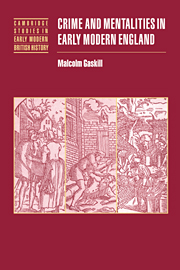8 - A transition from belief to certainty?
from Conclusion
Published online by Cambridge University Press: 05 July 2012
Summary
The minds of men can carry contradictory ideas, even contradictory hopes, with consummate ease. The acceptance of modernity does not imply the rejection of all tradition.
Plumb, 'The commercialization of leisure in eighteenth-century England', p. 316In 1977 Professor Sir Geoffrey Elton (as he later became) published an essay in which he acknowledged crime to be a discrete historical concern. From his guarded, perhaps even grudging, tone one cannot help feeling that for him a single decent monograph would have sufficed, and that his reaction to subsequent outpourings would have been less than enthusiastic. Quite what he would have thought of a book concerned with just three crimes one can only imagine. Elton was sometimes dismissive of the 'new' social history not because he thought its objectives worthless, but because so much traditional political and constitutional history had yet to receive attention. His concern is understandable. 'As some of the leading actors of history recede from our attention', E. P. Thompson wrote in the same year that Elton's essay appeared, 'so an immense supporting cast whom we had supposed to be mere attendants upon this process press themselves forward'. These were the people history had forgotten, their reanimation in its infancy. Yet many scholars were already fulfilling what Keith Thomas had predicted in 1966, namely that social history in the future would 'not be a residual subject but a central one around which all other branches of history are likely to be organized'.
- Type
- Chapter
- Information
- Crime and Mentalities in Early Modern England , pp. 283 - 311Publisher: Cambridge University PressPrint publication year: 2000



